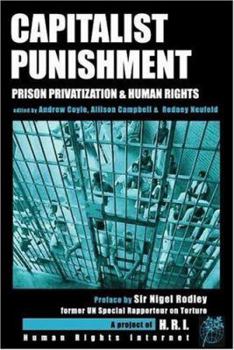Capitalist Punishment
Prison privatization is rapidly increasing in many Western countries. But how is the public well-being served when prisons are run for maximum profit? Bringing together an accomplished group of... This description may be from another edition of this product.
Format:Paperback
Language:English
ISBN:0932863353
ISBN13:9780932863355
Release Date:July 2008
Publisher:Clarity Press
Length:100 Pages
Weight:0.80 lbs.
Dimensions:0.5" x 6.1" x 9.0"
Customer Reviews
2 ratings
Excellent book on prisons
Published by Thriftbooks.com User , 19 years ago
Prison privatization has become a major public policy issue over the last few years, in America and around the world. Advocates say that private corporations can run prisons better and cheaper than the state. According to the contributors to this book, the promise is much greater than the reality. Prison corporations cut costs as much as possible, affecting things like education and rehabilitation programs for prisoners, staff salaries and training, which leads to a high yearly turnover of guards. An obstacle to greater privatization of prisons has been the power of prison guard unions. The cost savings don't go to the local government, but to the corporate office, where executives draw huge salaries. On more than one occasion, the state has had to take back control of a prison from a corporation, because of deaths in custody, or violations of prisoners' human rights, including those of juveniles. Blacks and Native Americans are in prison in numbers far higher than their proportion of the general population, because prison is a method of social control more than a way to make the streets safer. Private prisons make little or no attempt to incorporate native traditions, like sweat lodges, into the rehabilitation process. Putting prisons far away from cities, or shipping prisoners to other states, disrupts the family structure back home, leading to more children growing up without one or both parents. Women, and people with diagnosed medical conditions, also do not get their needs taken into account by private prisons. This is an excellent book. The writing gets rather dry and academic, so it will take some work on the part of the general reader; by all means, stay with it. It is well worth reading, for those involved with prisons and for the general public.
Diverse perspectives
Published by Thriftbooks.com User , 20 years ago
"Capitalist Punishment" is a scholarly but accessible study of the relatively recent phenomenon of prison privatization. Two dozen writers representing academia, human rights organizations, investigative journalism, criminal justice policy, labor and other relevant fields have contributed thoughtful articles to the book. The author's diverse perspectives gives the reader a well-rounded understanding of the subject and no doubt will inspire many to take action and work against the expansion of the industry. The book is a project by Human Rights Internet (HRI) of Ottawa, Canada. HRI is an organization dedicated to education on human rights issues and the role of civil society. Concise and well-written introductory and concluding chapters provide context for a number of sharply-focused articles that drill into specific subjects, such as the effects of prison privatization on women, minorities and prison workers. The book succeeds in informing concerned citizens and policy makers about the myriad obscure issues associated with prison privatization and its strong connection with human rights abuses. The first chapter by Phillip Wood is noteworthy for its excellent theoretical analysis. Mr. Wood examines the rise of the prison industrial complex in the U.S. and concludes that it is a policy response to postmodern economic restructuring. The author finds that the criminalization of race and poverty serves the dual purpose of preserving elitist privileges while preparing the working classes for an accumulation strategy based on capital's intensified exploitation of non-union labor. Another exceptional chapter was contributed by Monique Morris on the topic of the arrested development of African-Americans. Ms. Morris begins by discussing the historical legacy of legally sanctioned punishment against blacks in the U.S. She then finds that current punitive practices are merely an extension of policies that have disenfranchised and disempowered the African-American community for centuries. Private prisons serve to exacerbate these problems by offering a false solution to the media-induced spectacle of African-American criminality. On the whole, the articles in the book strongly suggest that the failures of prison privatization are attributable to the incompatibilty of the private pursuit of profit with the public good of rehabilitation. In order to produce income for shareholders, private prisons routinely skimp on employee training and inmate health care, education, and other vital services. The overcrowding and stress that results often creates conditions where physical and sexual abuse increase, and recidivism predominates as opportunities to properly prepare inmates for reentry into society are lost. The book also adopts somewhat of a social research methodology to compare the experiences in the U.S. -- which has been leading the charge in prison privatization -- with other countries including Canada, the U.K. and Australia. As human rights abuses,






